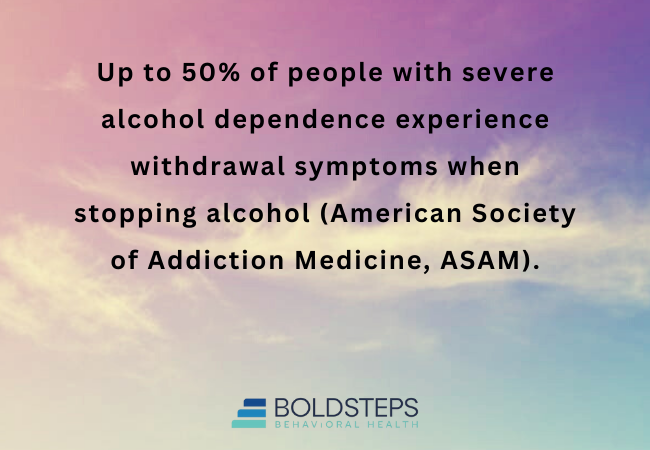For individuals struggling with alcohol addiction, detox is the first and most critical step toward recovery. The body must eliminate alcohol before true healing can begin, but many people fear the withdrawal process due to its potential discomfort and health risks. How long does alcohol detox take? What should you expect?
The truth is that alcohol detox can last anywhere from a few days to several weeks, depending on the severity of addiction, individual health factors, and medical support. Without proper treatment, withdrawal symptoms can become severe, even life-threatening, which is why medical detox at an Alcohol Detox Center in Pennsylvania is strongly recommended.
At Bold Steps Behavioral Health, we provide safe, medically supervised alcohol detox programs to help individuals manage withdrawal with professional care, medication support, and personalized treatment plans.
In this guide, we’ll cover:
- How long alcohol detox takes
- The withdrawal timeline and symptoms
- Why medical detox is necessary
- What to expect after detox
- New section: The Psychological Impact of Alcohol Detox
What Determines the Length of Alcohol Detox?
The length and severity of alcohol detox depend on several key factors, including:
- Frequency and duration of alcohol use – The longer someone has been drinking, the more dependent their body is on alcohol, resulting in a longer detox process.
- Amount of alcohol consumed daily – Heavy drinkers typically experience longer and more intense withdrawal symptoms than moderate drinkers.
- Age and overall health – Older individuals or those with pre-existing conditions may require a longer detox period.
- Metabolism and genetic factors – Some individuals metabolize alcohol faster than others, affecting detox duration.
- Presence of co-occurring disorders – Anxiety, depression, or PTSD can prolong withdrawal symptoms and increase the likelihood of psychological distress.
- Previous withdrawal history – Individuals who have gone through detox before may experience worsened withdrawal symptoms (a condition known as kindling).
The Alcohol Withdrawal Timeline: What to Expect
Alcohol withdrawal occurs in three distinct phases. While most individuals complete detox within 7-10 days, some may experience lingering symptoms for weeks or even months.
Stage 1: Early Withdrawal (6-12 Hours After Last Drink)
The first withdrawal symptoms begin within hours of stopping alcohol. This stage is usually mild to moderate, but symptoms can worsen quickly.
Common symptoms include:
- Anxiety and restlessness
- Nausea, vomiting, and loss of appetite
- Insomnia and irritability
- Sweating and increased heart rate
- Mild hand tremors
Stage 2: Peak Withdrawal Symptoms (24-72 Hours After Last Drink)
This stage is the most intense and dangerous, especially for individuals at risk of seizures or Delirium Tremens (DTs). Symptoms typically peak within 48 hours and can require immediate medical attention.
Common symptoms include:
- High blood pressure and irregular heartbeat
- Severe nausea, shaking, and body tremors
- Hallucinations (auditory, visual, or tactile)
- Disorientation, agitation, and mood swings
- Seizures (in severe cases)
Warning: Delirium Tremens (DTs) is a severe form of alcohol withdrawal that can cause seizures, fever, confusion, and hallucinations. DTs can be fatal without medical treatment.
Stage 3: Post-Acute Withdrawal (4-10 Days After Last Drink)
After the peak withdrawal phase, symptoms gradually subside, but individuals may continue to experience psychological and physical effects.
Common symptoms include:
- Lingering anxiety or depression
- Fatigue and low energy levels
- Sleep disturbances and vivid dreams
- Mild alcohol cravings
For some individuals, post-acute withdrawal symptoms (PAWS) can persist for weeks or months, making continued therapy and addiction treatment essential.
Why Medical Detox Is Essential for Alcohol Withdrawal
Many people assume they can detox at home, but alcohol withdrawal can be dangerous and unpredictable. Without medical supervision, symptoms can escalate rapidly, increasing the risk of complications such as seizures, dehydration, and severe mental distress.
How Medical Detox at an Alcohol Detox Center in Pennsylvania Helps:
✔ 24/7 medical monitoring – Ensures withdrawal symptoms are managed safely.
✔ Medication-Assisted Treatment (MAT) – Helps ease withdrawal discomfort and prevent seizures.
✔ IV fluids and nutritional therapy – Supports hydration and replenishes lost nutrients.
✔ Psychiatric support – Helps manage anxiety, depression, and alcohol cravings.
✔ Smooth transition to long-term treatment – Detox alone is not enough—patients need structured addiction treatment after withdrawal.
Medications Used in Alcohol Detox
At Bold Steps Behavioral Health, our Alcohol Addiction Treatment Program in Pennsylvania includes medication-assisted detox to help individuals safely transition through withdrawal.
Common medications used in detox include:
- Benzodiazepines (e.g., Ativan, Valium, Librium) – Reduce seizures, anxiety, and agitation.
- Anticonvulsants (e.g., Gabapentin, Carbamazepine) – Help prevent seizures.
- Beta-blockers – Manage high blood pressure and heart rate.
- Nutritional supplements (Thiamine, Folate, Magnesium) – Prevent long-term neurological damage.
The Psychological Impact of Alcohol Detox
Why Detox Affects Mental Health
Alcohol alters neurotransmitters in the brain, such as dopamine and serotonin, which control mood and emotions. During detox, the brain struggles to restore balance, leading to emotional instability and psychological distress.
Common psychological withdrawal symptoms include:
- Severe mood swings
- Anxiety and panic attacks
- Depression and suicidal thoughts
- Hallucinations or paranoia
- Cravings and obsessive thoughts about drinking
This is why therapy and emotional support are crucial during and after detox. At Bold Steps Behavioral Health, our detox program includes:
- One-on-one counseling to address emotional distress.
- Cognitive Behavioral Therapy (CBT) to help manage cravings.
- Group therapy sessions to provide peer support.
- Mindfulness and stress management techniques to promote healing.
What Happens After Detox? Next Steps for Recovery
Detox alone does not treat addiction—it simply removes alcohol from the body. Ongoing addiction treatment is needed to prevent relapse and build long-term sobriety.
Treatment Programs After Detox:
- Partial Hospitalization Program (PHP) – Intensive daily therapy with medical support.
- Intensive Outpatient Program (IOP) – Structured therapy several times per week for flexible recovery.
- Outpatient Treatment Program (OP) – Ongoing counseling and relapse prevention strategies.
At Bold Steps Behavioral Health, our Addiction Treatment Programs in Pennsylvania provide comprehensive care to help individuals transition from detox to long-term recovery.
Why Choose Bold Steps Behavioral Health?
- Licensed and accredited Alcohol Detox Center in Pennsylvania
- Medically supervised detox with 24/7 monitoring
- Personalized treatment plans based on individual needs
- Medication-Assisted Treatment (MAT) to ease withdrawal symptoms
- Comprehensive rehab programs, including PHP, IOP, and outpatient care
At Bold Steps Behavioral Health, we understand that overcoming alcohol addiction requires more than just detox. That’s why we offer comprehensive treatment programs that help individuals develop coping strategies, address the root causes of addiction, and build a healthier, alcohol-free future.
Conclusion
Alcohol detox is a critical first step on the road to recovery, but it is only the beginning of a lifelong commitment to sobriety. The withdrawal timeline varies for each individual, but with the right medical support, emotional care, and structured treatment, it is possible to transition safely from detox to long-term recovery.
If you or a loved one is struggling with alcohol dependence, don’t wait to seek help. Recovery is possible, and support is available. Let us guide you through the detox process and into a brighter, healthier future. Call (717) 896-1880 today to take the first step toward lasting sobriety. Your journey starts now.
Frequently Asked Questions About Alcohol Detox
How long does alcohol detox take?
Alcohol detox typically lasts between 5 to 10 days, but some individuals experience lingering withdrawal symptoms for weeks. The exact timeline depends on factors like the severity of alcohol use, age, health, and past withdrawal experiences.
What are the most common alcohol withdrawal symptoms?
- Anxiety and restlessness
- Nausea, vomiting, and sweating
- Insomnia and irritability
- Increased heart rate and high blood pressure
- Severe cases may involve seizures, hallucinations, or delirium tremens (DTs)
Can I detox from alcohol at home?
Detoxing at home is dangerous, especially for individuals with severe alcohol dependence. Without medical supervision, withdrawal symptoms like seizures or DTs can be life-threatening. A medically supervised detox at an Alcohol Detox Center in Pennsylvania ensures safety and comfort.
What happens if alcohol withdrawal is not treated?
Untreated alcohol withdrawal can lead to dangerous complications such as:
- Seizures
- Severe dehydration
- Heart complications
- Delirium Tremens (DTs), which can be fatal
What medications are used to ease alcohol withdrawal?
Doctors may prescribe:
- Benzodiazepines (e.g., Valium, Ativan) – Reduce seizures and anxiety
- Beta-blockers – Help control high blood pressure and heart rate
- Anticonvulsants – Prevent seizures
- Nutritional support (thiamine, folate, magnesium) – Replenish lost vitamins
What happens after alcohol detox?
Detox is only the first step in recovery. After detox, individuals should transition into a structured addiction treatment program such as:
- Partial Hospitalization Program (PHP) – Intensive therapy and medical monitoring
- Intensive Outpatient Program (IOP) – Flexible treatment with therapy sessions
- Outpatient Treatment Program (OP) – Long-term counseling and relapse prevention
How can I prevent relapse after alcohol detox?
- Participate in therapy and counseling
- Join a support group (such as AA or SMART Recovery)
- Develop a healthy lifestyle with proper nutrition and exercise
- Continue treatment with outpatient rehab programs
Does insurance cover alcohol detox?
Most insurance plans cover detox and addiction treatment programs. At Bold Steps Behavioral Health, we offer insurance verification to help individuals understand their coverage.





